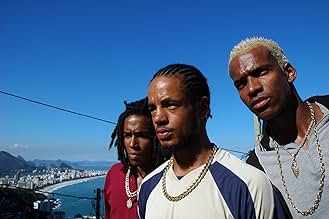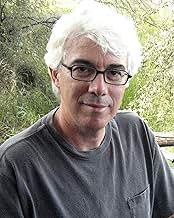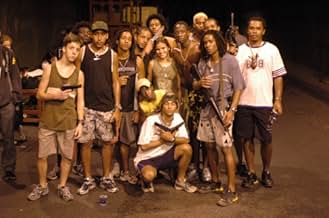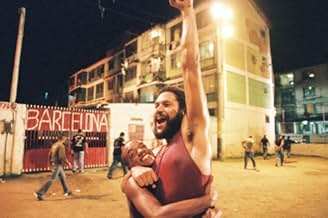Best buddies Acerola and Laranjinha, about to turn 18, discover things about their missing fathers' pasts which will shatter their solid friendship, in the middle of a war between rival drug... Read allBest buddies Acerola and Laranjinha, about to turn 18, discover things about their missing fathers' pasts which will shatter their solid friendship, in the middle of a war between rival drug gangs from Rio's favelas.Best buddies Acerola and Laranjinha, about to turn 18, discover things about their missing fathers' pasts which will shatter their solid friendship, in the middle of a war between rival drug gangs from Rio's favelas.
- Awards
- 14 nominations total
Naima Silva
- Camila
- (as Naíma Silva)
Eduardo 'BR' Piranha
- Nefasto
- (as Eduardo BR)
7.216.7K
1
2
3
4
5
6
7
8
9
10
Featured reviews
Not for everyone, but yet another important film educating all of us that we have a lot to be grateful for!
Director Fernando Meirelles' Brazilian gang warfare epic "City of God" made its mark in cinematic history as the premier film on depicting the horrors of drug trafficking & gang violence in Rio, Brazil's favelas. So why not a "city pass" on a sequel? A few years after the "City of God" fame, Meirelles and other collaborators including Director Paulo Morelli decided to produce a Brazilian TV episodic series entitled "City of Men" on the same premise. They casted young Brazilian actors Douglas Silva and Darlan Cunha as two charismatic best friends living their lives in spite of all the gang warfare that surrounds them in Rio's favelas. The series was a success, and the time to hit the silver screen came calling to the story of "City of Men". Even though "City of Men" does not involve the same characters of "City of God", it still does incorporate the same themes of it predecessor including: friendship, loyalty, drugs, poverty, violence, and survival. However, the overlying theme of "City of God" was drug trafficking with all the aforementioned as background themes. While the forefront of "City of Men" is the young protagonists' quest to find their unknown fathers with all the aforementioned also incorporated as background themes. "City of Men" does not excel in masterful storytelling and character development as "City of God" but it does hit the mark on the survival fortitude of its main protagonists. Meirelles only served as producer this time around and wisely transplanted the talents of Director Morelli and stars Silva & Cunha to the big screen adaptation. All of them hit the mark with their efforts. Even though many of the themes are terrifying and at sporadic times disturbing to look at, "City of Men" continues to keep it rio on the realities of a drug & gang induced life in Rio's favelas. **** Good
Sensitive and emotive movie
I just saw it and despite of the rough theme is a sensitive and emotive movie, very different from City of God. City of God was frenetic, full of effects, City of Men is more traditional and the narrative is more conventional. The traffic and the violence is in the background, the theme here is the paternity. Acting is first class, music is melodious and integrate to the scenes, photograph is similar to City of God. Above the summary: Laranjinha and Acerola are preparing themselves to adult life! At the age of 18, each boy has his own problems: Child, women, family, job, forgotten wishes and dreams are some of this adventure's spices, which, to add another pinch of thrill, tells about a war on the hill that will expel the young adults from their community. Will be definite all those changes?
Excellent Continuation of the TV Series, but not as good as 'God'
The film City of Men is a fantastic Brazilian film. It's directed by the same creator of City of God and the City of Men TV series. Now, personally, I recommend you watch the TV series before watching the movie due to many flashbacks throughout the film. The TV series also adds more depth to the characters that add to the overall enjoyment of the film. The film is still set in the favelas in Rio, but instead of focusing on the gangs as in City of God, it focuses on two 18 year old boys. The film is similar to City of God, but with a more light-hearted feel to it. The film also has similar cinematography. Overall, I prefer City of God to this film, but it is a worthy follow up to a fantastic film. 9 stars out of 10 in relation to City of God, but as a film in general, compared to the majority of films created this would deserve 10 stars.
God help us . . .
"Poverty, to be picturesque, should be rural. Suburban misery is as hideous as it is pitiable." Anthony Trollope
Whew! I'm out of breath following youth gangs in the favela of Rio as they fight for a city hill as if they were in WWII's Pork Chop battle. Machine guns rule; women do not (contrary to the stereotype of matriarchal Latin society). It may not be City of God, the frenetic precursor using two of the same actors, but it has the Battle of Algiers' claustrophobia, which had a better-appointed Kasbah yet the same feeling of people darting around corners to avoid ever present Death.
The two central characters, teenage boys trying to keep their friendship and families in tact while around them chaos rules, veer between themselves and annihilation as they fight off the temptation to carry weapons like their friends yet can't find a way to survive without guns. There is more, however, than just gang warfare because sub-textually director/writer Paulo Morelli identifies a root cause of the dislocationsabsentee fathers. (Heck, even the current Spiderwick uses this powerful ingredient.) Much of the film is dedicated to one of the boys finding his father and the other coming to terms with the murder of his. While the former is adequately explored, the latter could have used much more explanation for the boy's suddenly joining the gang's war. Could it have been the murder of his father? I can't tell you.
The requisite hillside shots of the Rio harbor help the figurative contrast between the rich Brazilian scenery and the squalor of the barrio. Both conditions, of course, help to emphasize the globally accurate distance between the have's and the have not's, a condition the present economic global downturn is exacerbating. City of Men is a city of all men, racing through the labyrinth of life trying to survive, and losing.
City of God is a movie that contradicts its name; City of Men is spot onGod help us.
Whew! I'm out of breath following youth gangs in the favela of Rio as they fight for a city hill as if they were in WWII's Pork Chop battle. Machine guns rule; women do not (contrary to the stereotype of matriarchal Latin society). It may not be City of God, the frenetic precursor using two of the same actors, but it has the Battle of Algiers' claustrophobia, which had a better-appointed Kasbah yet the same feeling of people darting around corners to avoid ever present Death.
The two central characters, teenage boys trying to keep their friendship and families in tact while around them chaos rules, veer between themselves and annihilation as they fight off the temptation to carry weapons like their friends yet can't find a way to survive without guns. There is more, however, than just gang warfare because sub-textually director/writer Paulo Morelli identifies a root cause of the dislocationsabsentee fathers. (Heck, even the current Spiderwick uses this powerful ingredient.) Much of the film is dedicated to one of the boys finding his father and the other coming to terms with the murder of his. While the former is adequately explored, the latter could have used much more explanation for the boy's suddenly joining the gang's war. Could it have been the murder of his father? I can't tell you.
The requisite hillside shots of the Rio harbor help the figurative contrast between the rich Brazilian scenery and the squalor of the barrio. Both conditions, of course, help to emphasize the globally accurate distance between the have's and the have not's, a condition the present economic global downturn is exacerbating. City of Men is a city of all men, racing through the labyrinth of life trying to survive, and losing.
City of God is a movie that contradicts its name; City of Men is spot onGod help us.
Cidade Dos Local Gangsters
Having not seen 'Cidade de Deus' nor the original TV series of which this movie is a continuation, as a stand alone I found 'Cidade dos Homens' to be quite satisfying. It kept me hooked from start to finish. Paula Morelli also gives great attention to detail and captures the local life in Rio de Janeiro quite realistically. With the backdrop of a local gang war, at the core of the film lies the friendship between Laranjinha and Acerola. Their friendship is put to test when the gangwar erupts and the identities of their fathers are discovered.
The cinematography is mostly done with a hand-held digital camera that gives a spacious feel while also stressing on the dense mazelike streets of the hills. The lighting stresses on the heavy heat of Rio de Janeiro. Music also works well with the story. The overall acting is very good with young actor Douglas Silva topping the cast.
'Cidade De Deus' has heart and the strength lies in the storytelling. The portrayal of corruption and poverty in Brasil is effectively portrayed. It shows how people are surviving everyday and how even the smallest 'mistake' can risk losing their lives.
The cinematography is mostly done with a hand-held digital camera that gives a spacious feel while also stressing on the dense mazelike streets of the hills. The lighting stresses on the heavy heat of Rio de Janeiro. Music also works well with the story. The overall acting is very good with young actor Douglas Silva topping the cast.
'Cidade De Deus' has heart and the strength lies in the storytelling. The portrayal of corruption and poverty in Brasil is effectively portrayed. It shows how people are surviving everyday and how even the smallest 'mistake' can risk losing their lives.
Did you know
- TriviaJonathan Haagensen, Mumuzinho and Thiago Martins are some of the actors returning after City of God (2002), portraying new roles.
- GoofsWhen Camila is showing Wallace her hair and telling him where Ace is, a leg of the tripod holding the close up camera is visible on the right side in the wide shot of them.
- SoundtracksFlor E O Espinho
(uncredited)
Written by Nelson Cavaquinho, Guilherme de Brito and Alcides Caminha
Originally recorded by Paulinho Moska
Sung by Rodrigo dos Santos (Heraldo) in the shower
Details
- Release date
- Country of origin
- Official site
- Language
- Also known as
- Thành Phố Của Đàn Ông
- Filming locations
- Production companies
- See more company credits at IMDbPro
Box office
- Gross US & Canada
- $325,131
- Opening weekend US & Canada
- $130,579
- Mar 2, 2008
- Gross worldwide
- $2,589,732
- Runtime
- 1h 46m(106 min)
- Color
- Sound mix
- Aspect ratio
- 1.85 : 1
Contribute to this page
Suggest an edit or add missing content


![City Of Men [Cidade dos Homens]](https://m.media-amazon.com/images/M/MV5BMTIyMzgyNTUyMl5BMl5BanBnXkFtZTcwMzQ2NTc3MQ@@._V1_QL75_UX500_CR0)




























